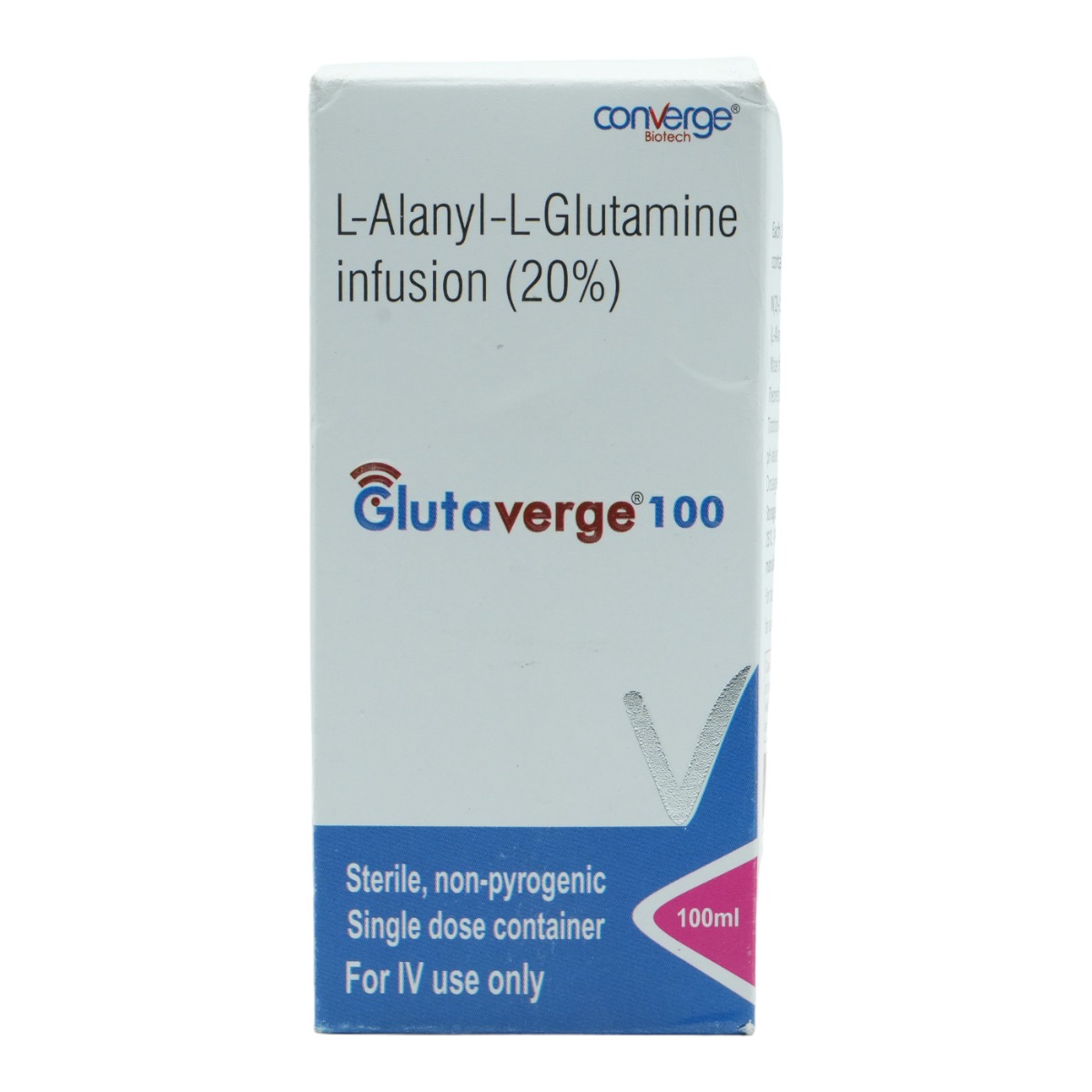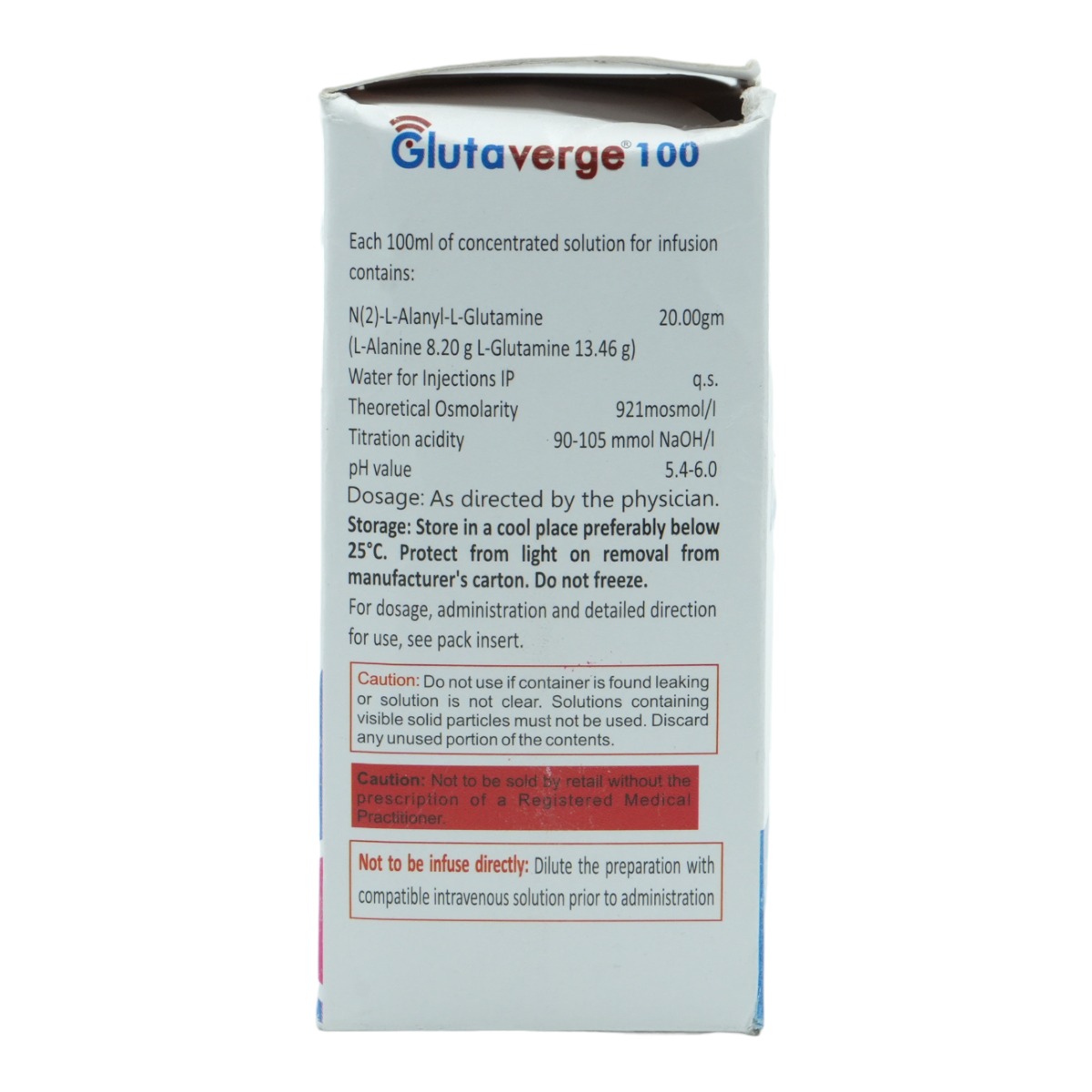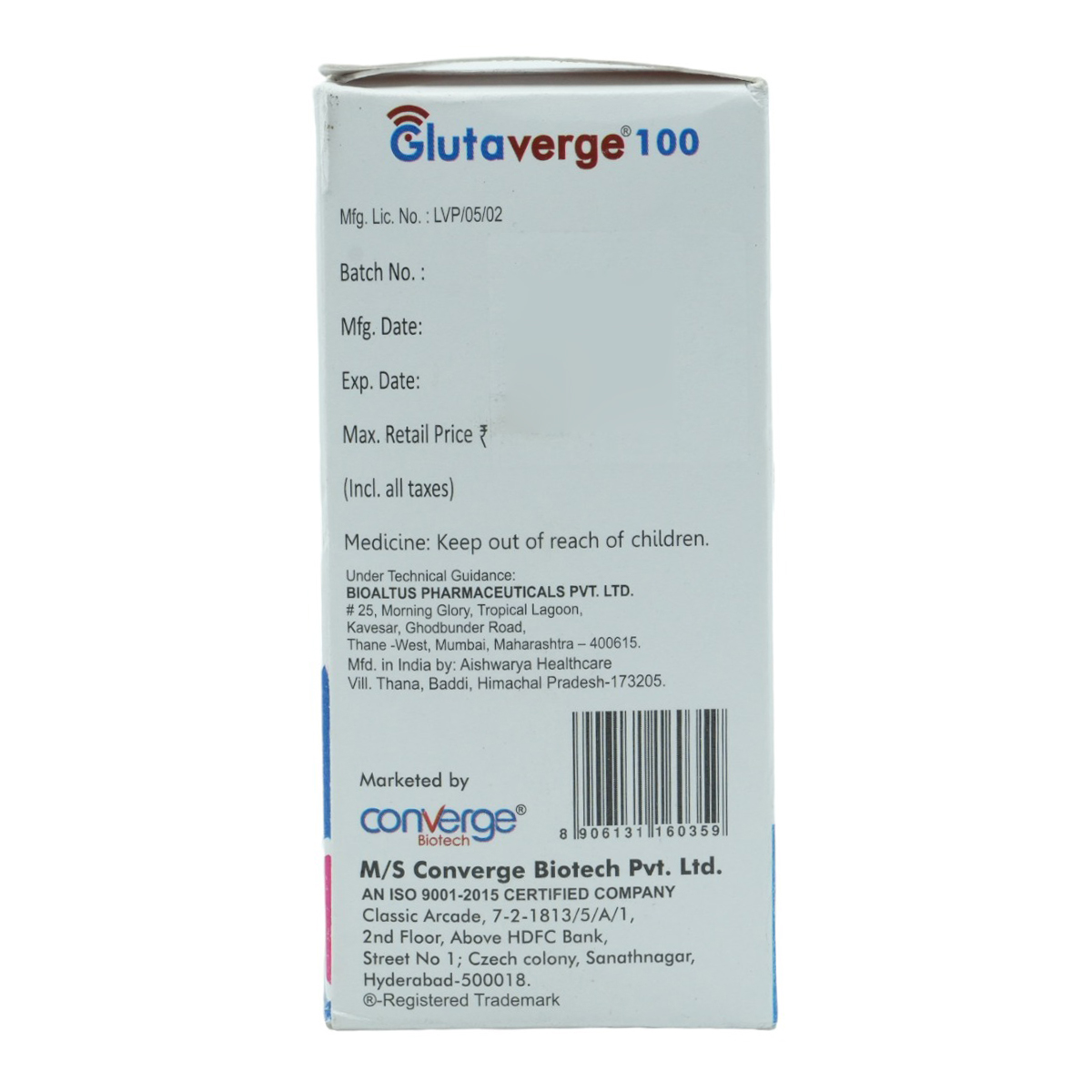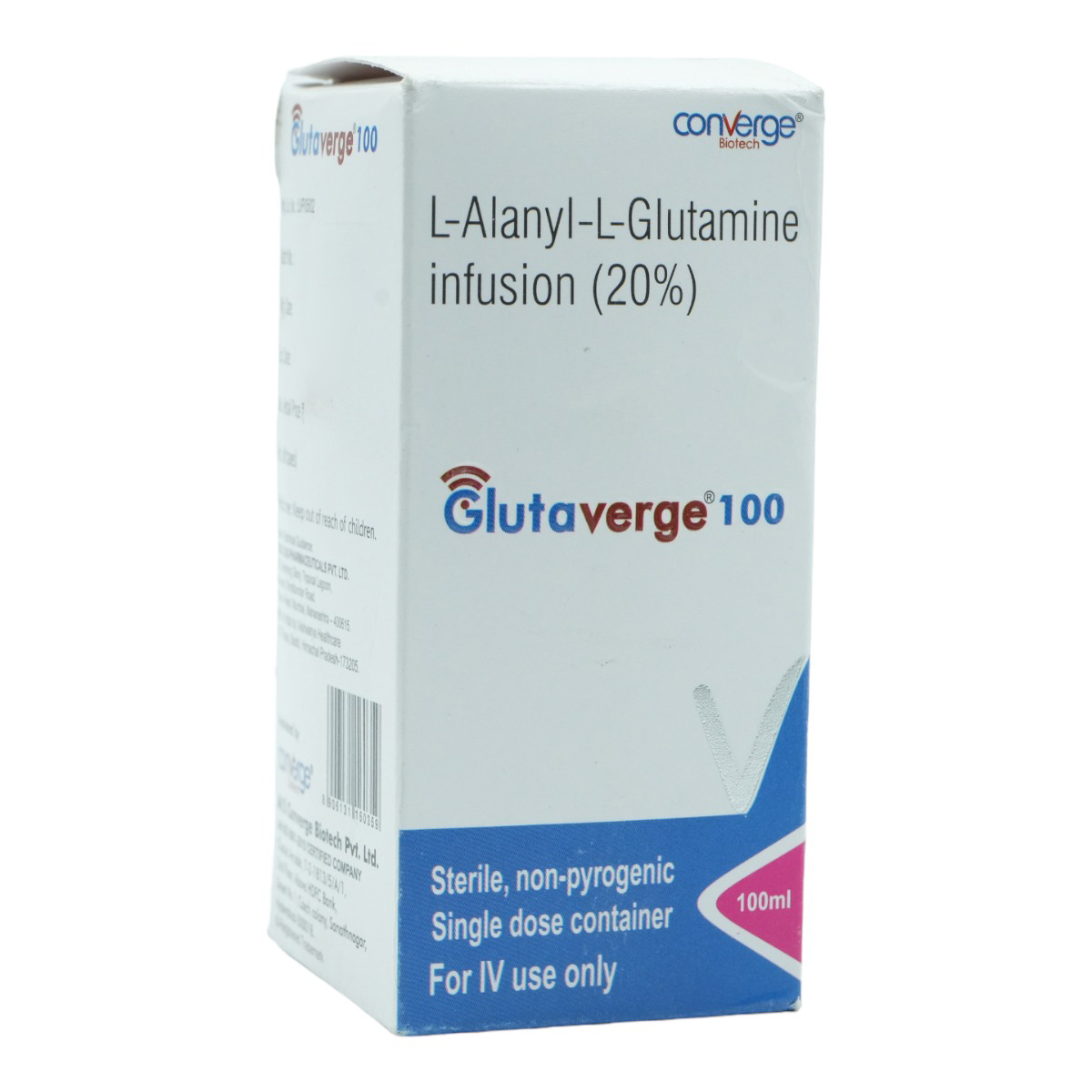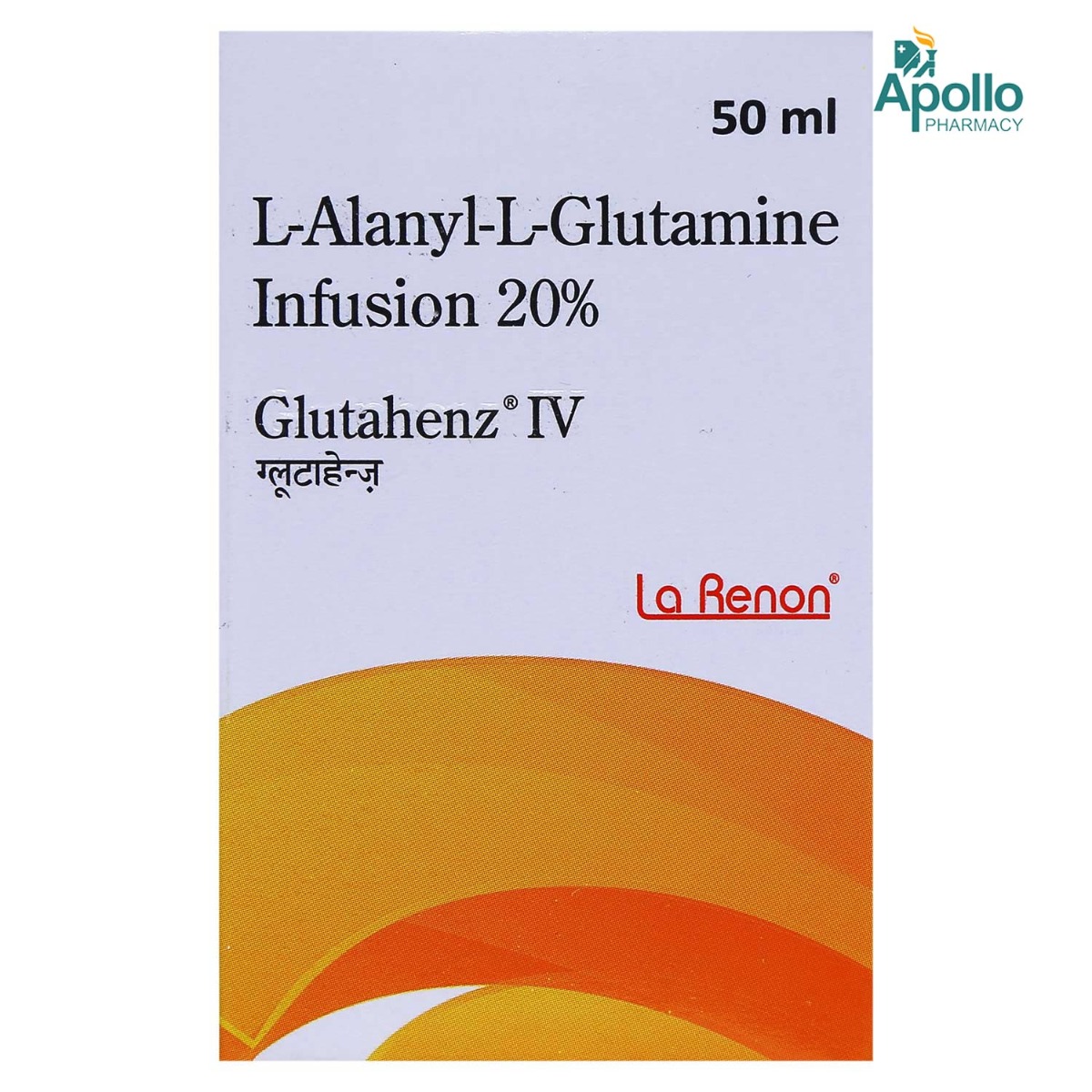Glutaverge 100 Infusion
MRP ₹3078
(Inclusive of all Taxes)
₹461.7 Cashback (15%)
know your delivery time
Provide Delivery Location
Composition :
Manufacturer/Marketer :
Consume Type :
Expires on or after :
Return Policy :

Secure Payment

Trusted by 8 Crore Indians

Genuine Products
Therapeutic Class
Country of origin
Manufacturer/Marketer address
Author Details
We provide you with authentic, trustworthy and relevant information
FAQs
Disclaimer
Alcohol
Safe if prescribed
It is not known if alcohol interferes with the working of Glutaverge 100 Infusion . However, it is advisable to limit or avoid consumption.
Pregnancy
Consult your doctor
Please inform your doctor before receiving Glutaverge 100 Infusion if you are pregnant or have any concerns regarding this; your doctor will give only if the benefits outweigh the risks.
Breast Feeding
Consult your doctor
If you are a nursing mother, inform your doctor before taking Glutaverge 100 Infusion ; your doctor will decide whether breastfeeding mothers can take Glutaverge 100 Infusion or not.
Driving
Safe if prescribed
It is unknown whether Glutaverge 100 Infusion affects your ability to drive. Drive or operate machinery only if you are alert.
Liver
Consult your doctor
Glutaverge 100 Infusion should be used with caution if you have liver impairment. So, inform your doctor if you have liver problems; your doctor will give only if the benefits outweigh the risks.
Kidney
Consult your doctor
Glutaverge 100 Infusion should be used with caution if you have kidney impairment. So, inform your doctor if you have kidney problems; your doctor will give only if the benefits outweigh the risks.
Children
Safe if prescribed
Please consult your doctor, as limited data are available on the use of Glutaverge 100 Infusion in children.
About Glutaverge 100 Infusion
Glutaverge 100 Infusion belongs to the class of medicines called amino acids. It is used alone or along with total parenteral nutrition (TPN); credited with helping in the recovery of trauma, surgical and other critically ill patients case as ICU patients, severe burn patients, gastrointestinal surgery patients, bowel obstruction patients, severe pancreatic patients, cancer chemotherapy or severe vomiting patients, or high output fistula patients. Besides this, it can also use as a part of nutrition to correct nutritional deficiency. A nutritional deficiency occurs when the body does not absorb or get enough nutrients from food. Glutaverge 100 Infusion is necessary for body development and the prevention of diseases.
Glutaverge 100 Infusion contains L-alanyl-L-glutamine. When administered, it is endogenously divided into two amino acids in the body: alanine and glutamine. The amino acids that are released enter their respective bodily pools as nutrients and are metabolised in accordance with the needs of the organism.
A qualified healthcare practitioner will administer Glutaverge 100 Infusion . Dosage is tailored to the severity of the medical state and the amino acid/protein needs. Glutaverge 100 Infusion is generally considered safe to use. Please get medical attention if you encounter any side effects.
If you are allergic or hypersensitive to any component of Glutaverge 100 Infusion , or if you are pregnant, expecting you are pregnant, plan to have a baby, or are breastfeeding, inform your doctor. Inform your doctor about your medical history, particularly if you have significant hepatic and renal impairment and any continuing medications, before taking the Glutaverge 100 Infusion to rule out any potentially harmful effects or interactions. Alcohol should be avoided when using this medication.
Uses of Glutaverge 100 Infusion
Medicinal Benefits Mweb
Key Benefits
Glutaverge 100 Infusion is an amino acid medication that is used to treat and prevent various medical conditions and nutritional deficiencies. L-alanyl-L-glutamine is present in Glutaverge 100 Infusion . When administered, it is endogenously converted in the body into two amino acids: alanine and glutamine. The amino acids released enter their respective biological pools as nutrients and are metabolised in line with the organism's needs, such as immune system strengthening, tissue building and repair, and the building of chemicals and proteins required by the body. It is also involved in detoxification activities and protects cells from oxidants and radiation.
Directions for Use
Side Effects of Glutaverge 100 Infusion
No side effects found
Drug Warnings
Before taking the Glutaverge 100 Infusion , inform your doctor about all your allergic or hypersensitivity reactions. And also, tell your doctor if you are pregnant or expecting, plan to have a baby, or are breastfeeding. Caution should be exercised while using Glutaverge 100 Infusion in hepatic or renal impairment patients. So, inform your doctor if you have; your doctor will give only if the benefits outweigh the risks. It is also essential to know about your medical history and other medications you are currently taking to rule out any potential negative effects.
Drug-Drug Interactions
Drug-Drug Interactions
Login/Sign Up
Drug-Food Interactions
Drug-Food Interactions
Login/Sign Up
Drug-Diseases Interactions
Drug-Diseases Interactions
Login/Sign Up
Habit Forming
Diet & Lifestyle Advise
- Create a well-balanced and healthy diet that includes vegetables, fruits, whole grains, legumes, omega-3-rich foods, and lean protein sources.
- Keep your weight under control with a BMI of 19.5-24.9.
- Avoid chronic stress. Meditation and yoga can help lower stress.
- Spend time with your loved ones to cope with stress and practice mindfulness techniques.
- Exercising regularly helps in improving overall health.
- Limit or avoid alcohol consumption.
- Avoid processed and fried food.
- Quitting smoking is the best strategy to reduce the risk of many medical illnesses.
All Substitutes & Brand Comparisons
RX
Out of StockGlutavie-IV Infusion 50 ml
La Vie Life Sciences
₹1570
(₹28.26/ 1ml)
11% COSTLIERRX
Fresenius Dipeptiven Infusion 100 ml
Fresenius Kabi India Pvt Ltd
₹3176
(₹28.58/ 1ml)
13% COSTLIERRX
Glutahenz IV Infusion 50 ml
La Renon Healthcare Pvt Ltd
₹1813
(₹32.63/ 1ml)
29% COSTLIER

Have a query?

